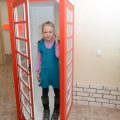Today we will not write about what can not be donefrighten the child with doctors, injections, and sweaters. The fact that such horror stories do not serve a good service, already, I hope, everyone knows. In this article, we will talk about the psychological impact of phrases that parents often speak on the machine, without thinking about the real power of the impact of these words.
1. "Leave me alone!"
This phrase may sound a little different,for example, "Leave me alone!" or "I'm already tired of you!" No matter how this phrase sounds, it gradually distances the child from the mother (or father - depending on who says it). Irina Ivanova, psychologist: If the child is so distracted from himself, he will perceiveit's like: "There's no point in contacting your mom, because she's always busy or tired." And then, having matured, he most likely will not tell you about his problems or the events that have occurred in their life. What should I do? Explain to the child when exactly you have time to play, take a walk with him. It's better to say: "I need to finish one thing, and you still paint. When I finish, we'll go outside. " Just be realistic: kids can not entertain themselves for an hour.
If the child is so distracted from himself, he will perceiveit's like: "There's no point in contacting your mom, because she's always busy or tired." And then, having matured, he most likely will not tell you about his problems or the events that have occurred in their life. What should I do? Explain to the child when exactly you have time to play, take a walk with him. It's better to say: "I need to finish one thing, and you still paint. When I finish, we'll go outside. " Just be realistic: kids can not entertain themselves for an hour. Photo: Getty Images
Photo: Getty Images
2. "What are you ..." (dirty, crybaby, hooligan, etc.)
We label our children:"Why are you such a hooligan?", "How can you be such a klutz?" Sometimes children overhear what we say to others, for example: "She is shy", "He is so lazy". Little children believe what they hear, even when it is about themselves. So negative labels can become self-fulfilling prophecies. Irina Ivanova, psychologist: There is no need to give a negative characterizationthe child's personality, talk about the child's behavior. For example, instead of the phrase "You're such a hooligan! Why did you hurt Masha?" say: "Masha was very sad and hurt when you took the bucket away from her. How can we comfort her?"
There is no need to give a negative characterizationthe child's personality, talk about the child's behavior. For example, instead of the phrase "You're such a hooligan! Why did you hurt Masha?" say: "Masha was very sad and hurt when you took the bucket away from her. How can we comfort her?"
3. "Do not cry, do not be so small!"
Someone once came up with the idea that tears area sign of weakness. Growing up with this attitude, we learn not to cry, but at the same time we acquire mental problems. After all, by not crying, we do not rid the body of the stress hormone that comes out with tears. Irina Ivanova, psychologist: The standard reaction of parents to the crying of a child -it's aggression, threats, moralizing, intimidation, ignoring. Extreme reaction (by the way, this is a real sign of parental weakness) - a physical effect. But what is desirable is to understand the root cause of tears and neutralize the situation.
The standard reaction of parents to the crying of a child -it's aggression, threats, moralizing, intimidation, ignoring. Extreme reaction (by the way, this is a real sign of parental weakness) - a physical effect. But what is desirable is to understand the root cause of tears and neutralize the situation.
4. "No computer, bye", "No cartoons, bye"
Parents often tell their child:"No computer for you, until you eat your porridge and do your homework." The "you give me, I give you" tactic will never bear fruit. More precisely, it will bear fruit, but not the ones you expect. Over time, the ultimatum barter will turn against you: "Do you want me to do my homework? Let me go outside." Irina Ivanova, psychologist: Do not teach your child to bargain. There are rules, and the child must follow them. Accustom to this. If the child is still small and does not want to put things in order, come up with, for example, the game "Who will remove the toys first." So you and the kid will be involved in the cleaning process, and teach him to clean things every night, and avoid ultimatums.
Do not teach your child to bargain. There are rules, and the child must follow them. Accustom to this. If the child is still small and does not want to put things in order, come up with, for example, the game "Who will remove the toys first." So you and the kid will be involved in the cleaning process, and teach him to clean things every night, and avoid ultimatums. Photo: Getty Images
Photo: Getty Images
5. "See, you can't do anything. Let me do it!"
The child is fiddling with the laces or trying tobutton up a button, and it's time to go out. Of course, it's easier to do everything for him, ignoring the angry childish "I'll do it myself." After this "caring help," the impulses of independence, as a rule, quickly dry up. Irina Ivanova, psychologist: "Give me better, you will not succeed, you do not know how,you do not know, you do not understand ... "- all these phrases pre-program the child to failure, instill in him uncertainty. He feels stupid, awkward, and therefore tries as little as possible to take initiative at home, at school, and among friends.
"Give me better, you will not succeed, you do not know how,you do not know, you do not understand ... "- all these phrases pre-program the child to failure, instill in him uncertainty. He feels stupid, awkward, and therefore tries as little as possible to take initiative at home, at school, and among friends.
6. "All children are like children, and you ..."
Think about how you feel ifyou are openly compared to someone. Most likely, you are overwhelmed with annoyance, rejection and even anger. And if an adult has difficulty accepting a comparison made to his disadvantage, then what can we say about a child, whose parents compare him to someone at every opportunity. Irina Ivanova, psychologist: If it is difficult for you to refrain from comparisons, thenbetter compare the child with himself. For example: "Yesterday you did your lessons much faster, and the handwriting was much more accurate. Why now did not try? "Gradually accustom the child to the skills of introspection, teach him to sort out his mistakes, find the reasons for success and failure. Give him support always and in everything.
If it is difficult for you to refrain from comparisons, thenbetter compare the child with himself. For example: "Yesterday you did your lessons much faster, and the handwriting was much more accurate. Why now did not try? "Gradually accustom the child to the skills of introspection, teach him to sort out his mistakes, find the reasons for success and failure. Give him support always and in everything.
7. "Do not be upset because of the nonsense!"
Maybe it really is nonsense - big deal,the car was taken away or not given, your girlfriends called your dress stupid, your house of blocks fell apart. But this is nonsense for you, but for him it is the whole world. Put yourself in his shoes, cheer him up. Tell me, would you be upset if your car, which you have been saving up for for several years, was stolen? You would hardly be happy about such a surprise. Irina Ivanova, psychologist: If parents do not support the child, but call himproblems as nonsense, then over time he will not share his feelings and experiences with you. By demonstrating disdain for the child's "sorrows", adults risk losing his trust. Remember that for children there are no trifles, and what we say accidentally can have irreversible consequences. One careless phrase can instill in the child the idea that he will not succeed and he is doing everything wrong. It is very important that the child always finds support and understanding in the words of his parents.
If parents do not support the child, but call himproblems as nonsense, then over time he will not share his feelings and experiences with you. By demonstrating disdain for the child's "sorrows", adults risk losing his trust. Remember that for children there are no trifles, and what we say accidentally can have irreversible consequences. One careless phrase can instill in the child the idea that he will not succeed and he is doing everything wrong. It is very important that the child always finds support and understanding in the words of his parents.









